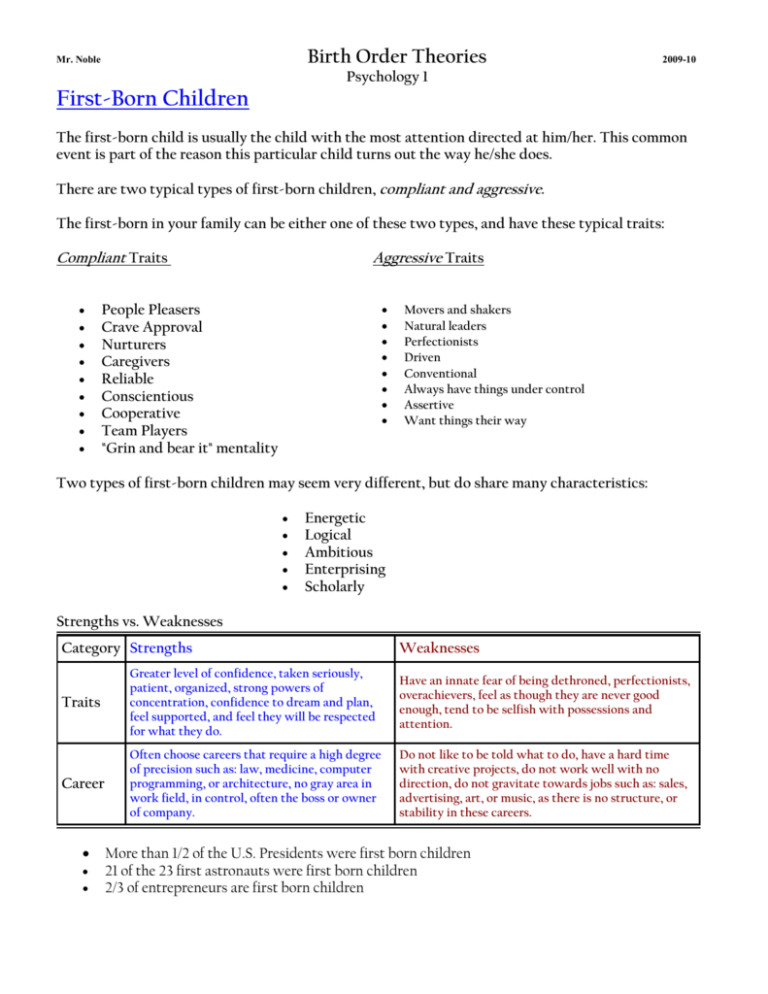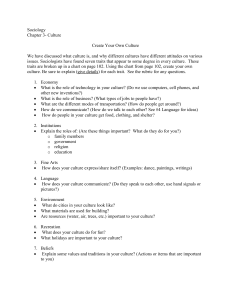First-Born Children
advertisement

Birth Order Theories Mr. Noble 2009-10 Psychology 1 First-Born Children The first-born child is usually the child with the most attention directed at him/her. This common event is part of the reason this particular child turns out the way he/she does. There are two typical types of first-born children, compliant and aggressive. The first-born in your family can be either one of these two types, and have these typical traits: Compliant Traits • • • • • • • • • Aggressive Traits People Pleasers Crave Approval Nurturers Caregivers Reliable Conscientious Cooperative Team Players "Grin and bear it" mentality • • • • • • • • Movers and shakers Natural leaders Perfectionists Driven Conventional Always have things under control Assertive Want things their way Two types of first-born children may seem very different, but do share many characteristics: • • • • • Energetic Logical Ambitious Enterprising Scholarly Strengths vs. Weaknesses Category Strengths Weaknesses Traits Greater level of confidence, taken seriously, patient, organized, strong powers of concentration, confidence to dream and plan, feel supported, and feel they will be respected for what they do. Have an innate fear of being dethroned, perfectionists, overachievers, feel as though they are never good enough, tend to be selfish with possessions and attention. Career Often choose careers that require a high degree of precision such as: law, medicine, computer programming, or architecture, no gray area in work field, in control, often the boss or owner of company. Do not like to be told what to do, have a hard time with creative projects, do not work well with no direction, do not gravitate towards jobs such as: sales, advertising, art, or music, as there is no structure, or stability in these careers. • • • More than 1/2 of the U.S. Presidents were first born children 21 of the 23 first astronauts were first born children 2/3 of entrepreneurs are first born children Birth Order Theories Mr. Noble 2009-10 Psychology 1 Middle-Born Children Two types: >Not as clearly defined as the two types of first-borns >Middle-Born #1 and Middle Born #2 Middle-Born #1 • • • • Middle-Born #2 Loner Quiet Shy Impatient Uptight • • • • • Outgoing Friendly Loud Laid back Patient Common Traits • • • • • • Flexible Diplomatic Rebellious Attention seeking Competitive Peacemakers Strengths vs. Weaknesses Category Strengths Weaknesses Traits Peacemakers, mediators, able to keep secrets, not spoiled, take risks, are realistic, get along Hate confrontation, stubborn, cynical, suspicious, and well with others, read people well, rebellious. independent, loyal to supporters, competitive, and imaginative. Careers Choose careers that allow them to be creative such as: sales, art, advertising, or a career that requires negotiating, well suited for management because of level headedness, and the ability to be unbiased. Do not do well with a hierarchy system, don't like strict rules, prefer to work at their own pace, and therefore may not complete tasks on time, do not work well with details, do not work well with cut and dry material, prefer to make things more creative than needed. Birth Order Theories Mr. Noble 2009-10 Psychology 1 Last-Born Children Last-born children tend to be the easiest to define when it comes to the correlation between birth order and personality; this is mostly due to the fact that there is only one main type of last-born. Last-Born Traits • • • • • • • • Risk takers Idealists Good sense of humor Hard working Immature Attention seeking Secretive Sensitive Last-born children often considered the baby of the family, and live up to this role. At times it is difficult for the last born child to find his/her place in the family, as the first and middle child have already left huge footprints to follow in, and carved their own niche into the family. Strengths vs. Weaknesses Category Strengths Weaknesses Traits Outgoing, sociable, affectionate, caring, creative, empathetic, and confident. Spoiled, manipulative, immature, self-centered, and capricious. Career Careers in sales, or invention corporations work well because of their ability to sell things, including themselves, work well alone, want to be the boss, and just do their own thing at their own pace. Do not like to be tied down to commitment, can be perceived as "cut throat", try too hard at times, alternative routes in life may make them the odd man out. Birth Order Theories Mr. Noble 2009-10 Psychology 1 Only-Born Children Only-born children are often referred to as "First-Borns in Triplicate", this is due to the fact that these children are extreme versions of first born children. Traits • • • • • • • • • Mature faster Get along well with older people Responsible Self-Centered Perfectionists Attention seekers Use adult language Prefer adult company Have difficulty sharing Only-born children are special type of birth order, in the sense that they are capable of being any of the three "main" types of birth order. However, most of these only-born children do possess characteristics commonly associated with the aggressive first-born child. Strengths vs. Weaknesses Category Strengths Weaknesses Traits Trust own opinion, prompt, ambitious, enterprising, energetic, set goals, good problem solvers, and ambitious. Self-centered, fearful of trying new things, criticize themselves and others, worry too much, feel they are always right, inflexible, and too busy to see the big picture. Career Choose careers similar to those of firstborn children such as: law, medicine, and architecture. Like black and white concepts and often prefer to work alone or be the boss, which accounts for their success. Do not like to be told what to do, often stray from teamwork situations, or take too much of the responsibility. May not respond well to criticism, and therefore may not improve on areas that are flawed. Birth Order Theories Mr. Noble 2009-10 Psychology 1 ADLERIAN* BELIEFS *according to Alfred Adler POSITION FAMILY SITUATION CHILD'S CHARACTERISTICS ONLY Birth is a miracle. Parents have no previous experience. Retains 200% attention from both parents. May become rival of one parent. Can be overprotected and spoiled. Likes being the center of adult attention. Often has difficulty sharing with siblings and peers. Prefers adult company and uses adult language. OLDEST Dethroned by next child. Has to learn to share. Parent expectations are usually very high. Often given responsibility and expected to set an example. May become authoritarian or strict. Feels power is his right. Can become helpful if encouraged. May turn to father after birth of next child. SECOND She/He has a “pacemaker.” There is always someone ahead. Is more competitive, wants to overtake older child. May become a rebel or try to outdo everyone. Competition can deteriorate into rivalry. MIDDLE Is "sandwiched" in. May feel squeezed out of a position of privilege and significance. May be even-tempered, "take it or leave it" attitude. May have trouble finding a place or become a fighter of injustice. YOUNGEST Has many mothers and fathers. Older children try to educate him. Never dethroned. Wants to be bigger than the others. May have huge plans that never work out. Can stay the "baby." Frequently spoiled. TWIN One is usually stronger or more active. Parents may see one as the older. Can have identity problems. Stronger one may become the leader. Child born after the death of the first child may have a "ghost" in front of her/him. Mother may become overprotective. Child may exploit mother's over-concern for his well-being, or she/he may rebel, and protest the feeling of being compared to an idealized memory. ADOPTED CHILD Parents may be so thankful to have a child that they spoil her/him. They may try to compensate for the loss of his biological parents. Child may become very spoiled and demanding. Eventually, she/he may resent or idealize the biological parents. ONLY BOY AMONG GIRLS Usually with women all the time, if father is away. May try to prove he is the man in the family, or become effeminate. "GHOST CHILD" Can become very feminine, or a tomboy and ONLY GIRL Older brothers may act as her protectors. outdo the brothers. May try to please the AMONG father. BOYS ALL BOYS If mother wanted a girl, can be dressed as a girl. Child may capitalize on assigned role or protest it vigorously. ALL GIRLS May be dressed as a boy. Child may capitalize on assigned role or protest it vigorously. Birth Order Theories Mr. Noble 2009-10 Psychology 1 VARIABLES >affecting all First, Middle, Last, and Only-born children • • • • • • Age/Styles/Configuration of Parents Number of Additional M/F Siblings Adoption/Remarriage Mental/Physical/Emotional Skills Loss of Parent/Sibling Sex/Gender GENERAL NOTES 1. 2. 3. 4. 5. 6. The psychological situation of each child in the family is different. The child's opinion of himself and his situation determines his choice of attitude. If more than 3 years separate children, sub-groups of birth order may form. A child's birth order position may be seized by another child if circumstances permit. Competition may be expressed in choice of interests or development of characteristics. Birth order is sometimes not a major influence on personality development. The other potentially significant influences are: organ inferiority, parental attitudes, social & economic position, and gender roles. 7. For more comprehensive information about birth order, read: What Life Could Mean to You, by Alfred Adler; The Individual Psychology of Alfred Adler, edited by Heinz and Rowena Ansbacher; and Lydia Sicher: An Adlerian Perspective, edited by Adele Davidson. 8. Adler speculated that birth order differences would begin to disappear when families became less competitive and autocratic, and more cooperative and democratic.







